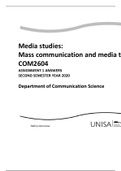Answers
COM2604 (MEDIA STUDIES: MASS COMMUNICATION and MEDIA THEORY) ASSIGNMENT 1 SOLUTIONS SECOND SEMESTER 2020
- Institution
- University Of South Africa (Unisa)
COM2604 (MEDIA STUDIES: MASS COMMUNICATION and MEDIA THEORY) ASSIGNMENT 1 SECOND SEMESTER 2020
[Show more]



